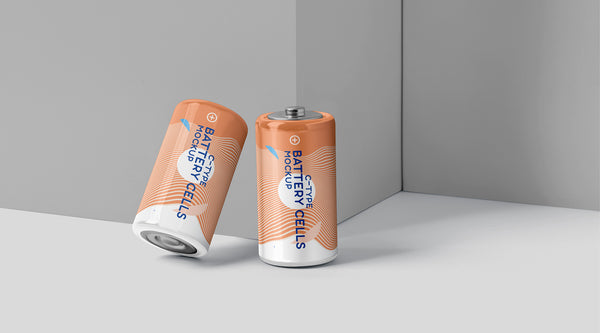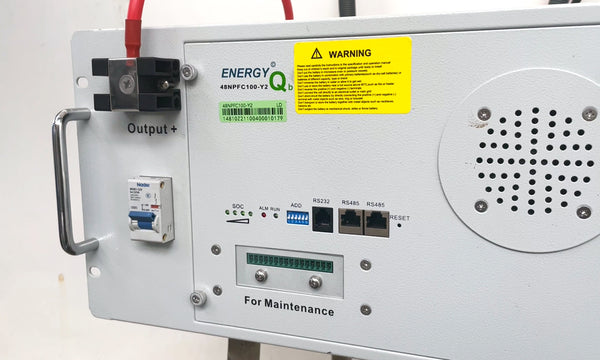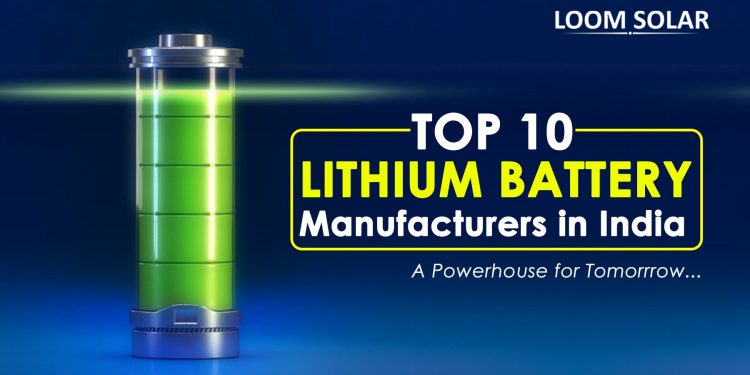Batteries having lithium as their anode are lithium batteries. They are becoming fast popular and are leaving behind their contemporaries like lead acid batteries. Lithium batteries are gaining a lot of traction in consumer electronic devices because of their low weight, high energy density, and longer lifetimes. Now, they are being used in energy storage and electric vehicles as well.
Perfect Energy Storage
2 times battery life, consumes 50% less space, needs no maintenance & takes 60% less recharge time
How Lihtium Battery Works?

A lithium battery comprises anode, cathode, separator, electrolyte and current collectors. When the battery is charging up, the positive electrode gives up some of its lithium ions which travels through the electrolyte to the negative electrode. The battery captures this energy and stores it. The movement of the lithium ions creates free electrons and creates a charge that flows to the device being powered.
How to make a battery?

From smartphones to electric cars to home energy storage devices, rechargeable batteries power our modern lives. But have you ever stopped to wonder what’s inside these devices that allow us to send emojis, drive around town and so much more? If so, check out the Advanced Battery Facility. So how do all these parts get assembled? Here are the seven most important steps in the process: https://www.loomsolar.com/blogs/collections/how-to-make-a-battery
Why should I choose it?

Lithium batteries have many advantages like high energy density, light weight, fast charging, portability, long life, safety, maintenance free, long life, etc. The technology is witnessing significant cost reductions. Keep in mind the following points before making a decision like application, backup time, capacity, technology, warranty, price, brands, etc.
Industry Highlights

EVs currently account for 24% of total global lithium demand. This figure is expected to rise to 79% by 2030. The balance 21% will come largely from electronics, energy storage, and other gadgets. The IEA estimates that lithium demand could increase by over 40 times by 2030 owing to the growth in EVs, according to the International Lithium Association (ILiA) . Last year lithium demand was about 320,000 tonnes and is expected to reach 1 million by 2025 and 3 million by 2030, according to Reuters. Lithium batteries are also finding increased application in telecom, energy storage, government projects and toys.
Tesla is one of the global leaders which consumes lithium battery in electric vehicles and energy storage. Tesla is one of the largest consumers of lithium globally used in its increasing manufacturing of electric cars. The company bagged a long-term contract with a large lithium producer, Ganfeng. By 2030, EVs will need 2,700 GWh worth of lithium-ion batteries every year. Panasonic, is the top three global EV battery manufacturer from Japan and Tesla’s long-time partner is another major player in lithium battery technology. Samsung, Panasonic and LG are also global leaders in telecom sectors.
Reliance, Mahindra, Ola are such names which has planning to setup lithium battery manufacturing plants in India to full fill lithium battery consumption.
Reliance’s telecom towers are powered by Li-Ion battery. Reliance is in talks with Ambri to set up a battery manufacturing giga-factory in India. Ambri is a US-based company focusing on liquid metal batteries. Ola expects to make 15% of the world’s e-scooters by mid-2022. Adani, Suzuki, Mahindra, JSW, Hero are all planning to set up multi-billion dollar battery plants in India.
Automobile Battery Leaders, Exide and Amaron has also plan to invest ……..Crs. in lithium battery manufacturing factory.
Finally, energy storage is also one of the consumptions of battery, so residential consumer companies, such as Loom Solar, Luminous, Okaya, working for consumers.
Trending News
India discovers Lithium reserves in Karnataka
India discovered 1600 tonnes of lithium in Mandya district of Karnataka. Lithium has become a hot commodity given its application in batteries for electric vehicles which is expected to change the Indian transportation industry. India expects ~30% of car sales to be electric and 50% of its energy requirements from renewable energy by 2030. Moreover, Indian government’s PLI scheme also envisions incentives to set up facilities for advanced batteries.
Source:https://www.youtube.com/watch?v=G49xdMkL_qo
Reliance New Energy Solar to Acquire Faradion Limited
In another news, Reliance New Energy Solar has agreed to acquire Faradion Ltd, a leading global sodium-ion battery technology company. The company claims Faradion’s sodium-ion technology provides significant advantages compared to lithium-ion technology.
Source: https://faradion.co.uk/reliance-new-energy-solar-to-acquire-faradion-limited/
ACC-PLI scheme: Amara Raja, Exide, L&T, Lucas TVS and Ola Electric among 10 firms looking to set up giga factories in India
India is targeting to establish a total of 50 Gwh of battery storage capacity over five years. To qualify for the incentives, companies must set up at least 5 Gwh of storage capacity. Around 10 companies have submitted bids totalling ~100 Gwh under this scheme.
The Union Cabinet approved the PLI scheme on ACC battery storage with an outlay of Rs. 18,000 crores to make India self-reliant in the manufacturing of advanced storage technologies. India currently imports battery storage equipment worth Rs.20,000 crore. Companies like Reliance Industries, L&T, Exide, Amara Raja, Lucas TVS, Mahindra and Mahindra, and Ola are looking at setting up ACC battery storage manufacturing in India.
Lithium Battery Buying Guide
Lithium battery is becoming increasingly popular due to its numerous advantages when compared to conventional battery systems. It is been used aggressively in electric vehicles, and as energy storage in solar systems used in home inverters, home lighting systems, street lights, etc.
Not only residential, lithium batteries are also used in commercial applications as they are less bulky. These batteries are also being used in toys, electronic gadgets, science and DIY projects as they are generally smaller and lighter in weight. This is a big advantage which helps its application in various portable consumer electronic devices. Lower recharge time and maintenance leads to longer shelf lives. They can also handle hundreds of charge-discharge cycles.
1. Application

Lithium ion batteries have been used in a wide applications in the past as mobile phones, laptops, toys, etc. It is also getting used in energy storage ie. Inverter battery and electric vehicles. The home lighting system/ emergency lights and street lights have lithium batteries in it. These street lights are automatically switched on and off. Lithium batteries are also used in devices to check the water level in agricultural land farms.
2. Backup

Back up is the next deciding criteria to choose the battery. For instance, an office having a consumption of 1500-200 watts needs battery 5kWh laptop, computer, printer, lights, etc. Also, take into account the power cut in your area.
3. Capacity

Capacity depends upon continuous load and power backup.
4. Charger

Three major sources for lithium battery charging: grid, charger which can be charged through Charger, Inverter and Solar Panel. Can be charged/ discharged 2000 times in its life time.
Lithium Battery Charging time is 4 hours.
Charger Capacity (in Ampere) = Battery Capacity / Charging Time
5. Warranty

The battery comes with a warranty of 6months – 5 years. Loom Solar CAML battery comes with 3 years warranty. The battery has a life of 10 years.
Top 10 Lithium Battery Manufacturer in India, 2024
On the basis of industry expert discussion and trusted media sources, we are giving top 10 lithium battery manufactures in India (will lead in lithium battery industry in India)
1. Loom Solar – Energy Storage

As Loom Solar adds Lithium Battery to its product portfolio, it incidentally also becomes the first lithium battery manufacturer to offer 6Ah to 100 Ah range in the consumer segment through retail channels and online marketplaces. With this B2C venture, the customers will have the advantage to use the same for home applications. Loom Solar has worked on product integration through continuous research and innovation to work on customised designs for the evolving Lithium battery segment.
2. Reliance – EV

Reliance New Energy Solar has bought Faradion, a UK start-up developing sodium-ion batteries. The Indian business giant is investing in Faradion to accelerate the commercialization of batteries for electric vehicles. The company claims sodium-ion technology is safer as well as cheaper. If successful, Reliance will benefit both in in renewable power storage as well as vehicles. Reliance is also building an integrated and giga scale manufacturing facility in India.
3. Mahindra – EV

Another leading car manufacturer Mahindra is expanding aggressively into EVs. The company alongwith Hyundai and Reliance recently submitted bids under the India’s $2.4 billion battery scheme. Mahindra also launched the country’s first ever lithium-ion battery powered auto rickshaw/ Mahindra Treo, e-rickshaw and cargo version. The company is also launching a wide range of cars in electric version.
4. Hyundai – EV

Hyundai, one of the leading car companies in India, has gone electric with the launch of a premium electric vehicle, Kona. The company has partnered with quantum computer firm, IonQ for battery development. The partnership will focus on improving the durability, capacity and safety of lithium batteries to be used in electric cars.
5. Ola – EV

Ola was one of the ten Indian companies to apply for the PLI scheme for battery manufacturing. Ola was one of the first few shared cab services to foray into an electric fleet. Back in 2017, Softbank through its company Ola put in plans to run 1 million electric vehicles in India and announced that they would form a new company Ola Electric Mobility Pvt Limited which would lease electric vehicles such as cars and buses and two-wheelers to its partner drivers. Ola Electric Mobility has pledged to build the world’s biggest electric scooter factory.
6. Amarraja (Amaron) – EV

Amaron is a power brand of the Amara Raja Group. It is a technology leader and one of the largest manufacturers of lead-acid batteries for both industrial and automotive applications in the Indian storage battery industry. The battery major is transitioning from lead acid batteries to lithium ion batteries, and solutions for electric mobility. It is also planning to make for a giga factory to produce batteries for electric vehicles.
7. Exide – EV

Exide Industries is India’s largest selling battery company. Exide plans to participate in the PLI Scheme for National Programme on ACC battery storage and it recently forayed into lithium ion cell manufacturing.
8. Panasonic – Telecom

Panasonic offers a wide range of lithium batteries to be used in small devices, backup battery for emergency, etc. It comes with long-term reliability suitable for outdoor devices and superior characteristics in a wide temperature range. Panasonic batteries are thinner and lighter for use in devices like notebook computers and mobile phones.
9. LG -Telecom
The Korean giant is the No. 1 lithium ion battery manufacturer by capacity globally. The company is making strong inroads in lithium battery manufacturing and is setting up large manufacturing capacities worldwide.
10. Samsung – Telecom
We will update content here.
From Where should I buy it?
Batteries account for ~35% to 40% of the total vehicle cost and is an important decision maker. Be it for electric cars or energy storage, lithium batteries are facing increased demand and hence a large number of companies are exploring this current opportunity at hand. Given a long list of players to choose from, it becomes difficult for buyers to decide from where to buy.
Today it is easy to buy batteries online as the technology is water-proof and less bulky. Earlier customers had to rely only on local suppliers. But today they can easily buy online. The inverter battery is easy to transport with no damage.
Conclusion
We need a reliable battery and Inverter to provide the required power. Hence, the importance of choosing the right battery for your homes. At present, any consumers can buy lithium battery online for energy storage with loom solar. We have wide range lithium battery for commercial, residential and EV solutions. Loom Solar, a lithium battery manufacturer, provides a wide range of batteries from small to large capacity (75Wh to 5kWh) for your home, office, school, hospital, restaurants, etc. Please visit our website to see the wide of range of products that we offer.


















